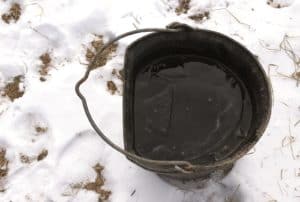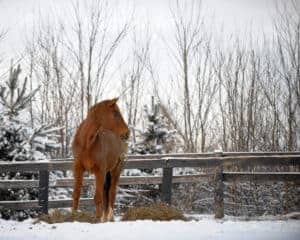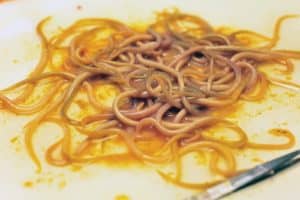
How Long Can a Horse Go without Water During the Winter?
Find out from Dr. Nancy Loving how frequently a horse needs to drink during the winter to stay healthy.


Find out from Dr. Nancy Loving how frequently a horse needs to drink during the winter to stay healthy.

Dr. Nancy Loving talks about the risks horses face when they don’t drink enough during the winter.

Horses for Clean Water’s Alayne Blickle and Dr. Nancy Loving discuss whether or not horses will drink icy water.

Dr. Nancy Loving weighs the pros and cons of keeping horses inside vs. turning them out in the mud.

Dr. Nancy Loving shares signs that a horse is cold and lets you know how to keep him warm.

Dr. Nancy Loving talks about keeping senior horses well-fed and in good weight during the winter.

Equine metabolic syndrome and Cushing’s disease prevention start from birth and include regular veterinary exams and proper nutrition.

Practicing fecal egg count testing, selective deworming, and other management strategies to help ward off increasing parasite resistance to anthelmintics.

Equine Cushing’s disease occurs in an estimated 15-30% of horses and ponies older than 20.

Whether a veterinarian is actively practicing or working in research, ethics play a central role in his or her decision-making.

Veterinarians determined that a modern version the so-called fetlock support shoe could be helpful in treating suspensory desmopathy in horses.

Endocrine problems are common in elderly equids. By screening all equine seniors for such problems veterinarians can pick out problem horses quickly and implement treatment protocol.

Brannaman said owners need to train their horses to yield softly to their humans–including veterinarians–rather than yielding out of fear.

Jumpers’ forelimbs withstand tremendous impact, so the bones of their knees and neighboring ligaments at the upper part of the cannon bone are prone to injury.

The lower limb is the most common site of lameness in English-discipline equine athletes, one veterinarian says, so sport horse practitioners must be well-versed in how to diagnose injuries in this region.

Could something smaller than a pea end a horse’s athletic career? If that something is a cystic lesion in the stifle, it’s possible. But specific management approaches can help some horses return to their jobs with few, if any, lasting effects.
Stay on top of the most recent Horse Health news with